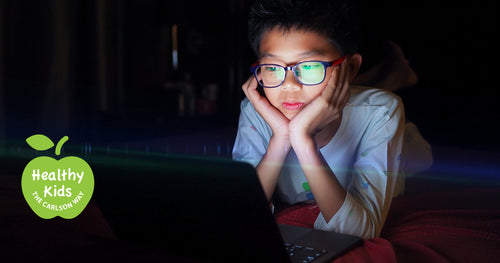
Do you frequently feel fatigued during the day and yet you have trouble sleeping at night?
Signs of Blue Light Exposure
Short-term blue light exposure can lead to symptoms like eyestrain, fatigue, and headaches, and longer-term exposure has more serious effects. Recent trends in our screen-use behavior put our vision and health at risk, regardless of our age. Too much time in front of our computer screens, phones, and tablets can have consequences on our eyesight.
Nutrients That Provide Blue Light Protection
Fortunately, we can help protect our eyes from blue light damaged with targeted nutrients: lutein, zeaxanthin, and the omega-3 DHA.
The quality of our vision isn’t the only health issue to consider with all of this screen time. Exposure to blue light from digital devices also reduces our ability to make melatonin, the hormone that sets our circadian rhythm. This means screen time in the hours just before bedtime will likely disrupt our sleep. The loss of sleep often means we are less alert during the day, which affects not only our performance of physical tasks but also our ability to think well on the job or at school.
The powerful carotenoids lutein and zeaxanthin, which are found in yellow, orange, and green foods, are protective against the harmful effects of blue light. Lutein is related to vitamin A and is concentrated in the macula, so it’s a necessary component of healthy vision. It also works as an antioxidant to reduce free-radical damage. Foods rich in these colorful carotenoid compounds include kale, squash, collard greens, corn, spinach, Swiss chard, arugula, Brussels sprouts, broccoli rabe, pumpkin, sweet potatoes, carrots, asparagus, and egg yolks. Egg yolks also provide the omega-3 DHA, as does cold-water fish like salmon and tuna.
When searching for a supplement, look for the trademarked version of lutein, Lutemax 2020. Lutemax 2020 provides lutein, zeaxanthin, and meso-zeaxanthin – three carotenoids that best help protect our eyes, reduce eyestrain, and support glare tolerance from high-energy blue light and digital device use. Also be sure to get at least 500 mg daily of the omega-3 DHA, and at age 40 bump that up to 1,000 mg daily. Along with supporting vision health, DHA promotes healthy cognitive function.






